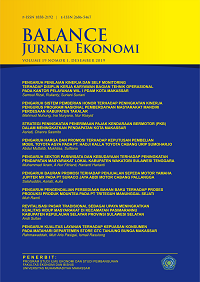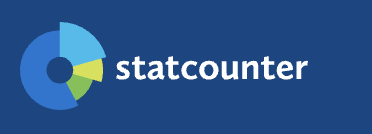Potential development of halal tourism in improving people's welfare in the Selayar Islands Regency
DOI: https://doi.org/10.26618/jeb.v18i2.7897
Development, Halal Tourism, Community Welfare
Abstract
This study aims to find out how the potential for developing halal tourism in improving the welfare of the people in the Selayar Islands Regency is. The type of research used in this research is field research that produces descriptive data in the form of written or oral data of people (informants) and observed behavior. While the data research techniques used in this study were interviews, observations (observations), and documentation. The results obtained from this study are how the potential for developing halal tourism in improving the welfare of the people in the Selayar Islands Regency is because currently there is no halal tourism object developed by the Selayar Islands Regency Tourism Office. Based on the results of observations and interviews in the Sunari coastal tourism area, it is still relatively new and the Selayar Islands Regency Tourism Office will continue to communicate with the village government for the development of the Sunari beach tourism area, Selayar Islands Regency. Although the tourism office has not taken any steps to get there, the local tourism office supports the development of halal tourism in the Sunari beach tourism area, Selayar Islands Regency. For visitor responses regarding the potential for developing halal tourism in improving the welfare of the community in Bulukumba Regency, around 99% of visitors to Sunari Beach tourism in Selayar Islands Regency said they agreed because they saw the majority of the community were Muslim, especially in Selayar Islands Regency there was no halal tourismReferences
Al-quran Surat Al-Mulk (15:67) dan Terjemahnya Kementrian Agama Republik Indonesia.
Afrianti,N,. 2017. Analisis Strategi Pengembangan Pariwisata dalam Meningkatkan Pendapatan Asli Daerah (PAD) Kota Bandar Lampung, (online). Diakese tanggal 27 November 2021.
Andriani,D. et.al. 2015. pengembangan wisata syariah,kemmenpar,Jakarta.
Awalia, H. 2017. Komodifikasi Pariwisata Halal NTB dalan Promosi Wisata Islami di Indonesia, (Online)Vol. 1 No 1 (http://ejournal.unitomo.ac.id) di akses pada tanggal 11 November 2021. Pukul 14.45 WITA.
Crescentrating .2019. Crescentrating:word’s leading authority on halal travel, (online) di akses di (http://www.crescentrating.com) pada tanggal 09 November 2021. pukul 21.45 WITA.
Dinas Pariwisata Kabupaten Kepulauan Selayar. 2021. Jumlah Kunjungan wisatawan Tahun 2021. Selayar.
Fitratun R. 2018. Implikasi Pariwisata Syariah Terhadap Peningkatan Pendapatan dan Kesejahteraan Masyarakat, (Online) Vol. 3 No 1 ( http://ejournal. iainponogoro.ac.id) di akses pada tanggal 12 November 2021. Pukul 20.30 WITA.
Fitriani, H. 2018. Proyeksi Potensi Pengembangan Pariwisata Perhotelan dengan Konsep Syaraih, (Online)Vol. 1 No 3 (http://ejournal.stainponogoroac.id) di akses pada tanggal 10 November 2021. Pukul 12.30 WITA.
Hasan, AR. 2007. Islamic Tourism Revisited, a Note from The Editor. Islamic Tourism. 32(2): 1.
Jaelani, A. (2017). Halal tourism industry in Indonesia: Potential and Prospects (No. 76235). Retrieved from https://mpra.ub.uni-muenchen.de/76235/ (2017). Industri wisata halal di Indonesia: Potensi dan prospek.Mpra,(76237),1–20 https://doi.org/10.13140/RG.2.2.29350.52802.
Kadir Jaelani, A. (2018). Pengembangan Destinasi Pariwisata Halal Pada Era Otonomi Luas di Provinsi Nusa Tenggara Barat. Jurnal Pariwisata, 5, 56– 67. https://doi.org/10.31311/par.v5i1.3277.
Masful, M. F. 2017. pariwisata syariah: suatu konsep kepercyaan dan nilai budaya lokal di daerah pedalaman pilubang, payakumbuh, sumatera barat, (Online)Vol. 9 No 1 (http://ejournal.usm.ac.id) di akses pada tanggal 10 November 2021. Pukul 12.30 WITA.
Muzakir. 2018. Respon masyarakat Banyumulek Terhadap Pariwista Syariah dalam Meningkatkan Kesejahteraan Masyarakat, (Online)Vol. 3 No 1 ( http://ejournal.kopertais4.ac.id) di akses pada tanggal 10 November 2021. 10.00 WITA.
Oka A. Yoeti, Ekonomi pariwisata introduksi, nformasi dan implementasi, (Jakarta Kompas 2008).
Pradesyah, R, dan khairunnisa. 2018. Analisis Penerapan Fatwa DSN MUI wisata Halal (Studi Kasus Hotel Syariah Medan), (Online)Vol. 1 No 2 (http://ejournal.umsu.ac.id) di akses pada tanggal 10 November 2021. Pukul
30 WITA.
Rimsky.J. 2017. Aktivitas dan Kompleksitas Kepariwisataan. Jarkarta: Gramedia Pustaka Utama.
Santoso, H., dan Adi, H. 2018. Potensi pengembangan wisata berbasis syariah (halal torism), di kota Bima, (Online)Vol. 2 No 1 (http://ejournal.unmuhjember.ac.id) di akses pada tanggal 12 November 2021. Pukul 21.00 WITA.
Shakiry, A.S. (2006). The Academy of Islamic Tourism Project. Islamic Tourism, 25 (September– October). Diakses 28 Oktober 2021 pada http://islamictourism.com/.
Subarkah, A, R 2018. Diplomasi Pariwisata Halal Nusa Tenggara Barat. Intermestic: Journal ofinternational Studies, Volume 2, No. 2, Mei 2018(2), 188-203.
Yudiana, M. M. H. & Y. 2015. Analisis Komparatif Potensi Industri Halal dalam Wisata SyariahdenganKonvensional.Retrievedfromhttp://catatanek18.blogspot.com/2015/02/analisis-komparatif-potensi- industri.html
Sugiyono. 2013. Metode Penelitian Pendidikan Pendekatan Kualitatif, Kualitatif dan R&D. (Alfabeta Bandung).
http://eprints.umm.ac.id/50373/3/BAB%20III.pdf. Diakses. Tanggal 15 November 2021.
Hendri Hermawan Adinugraha, (2018), Konsep dan Implementasinya di Indonesia, jurnal bisnis, Vol. 5.No. 1.
Muh Zainii. 2019, Pengembangan Pariwisata Halal Berbasis Masyarakat Untuk meningkatkan kesehjateraan (Studi Kasus Pada Desa Wisata Sembalun Lawang, Kecamatan Sembalun, Kabupaten Lombok Timur, Nusa Tenggara Barat. (di akses 15 November 2021)













